Nearly half of Brits sleep for less than six hours a night, study says
The research found that 47 per cent of adults aren't getting enough sleep

If you have tried counting sheep, drinking camomile tea and listening to whale music but still find yourself lying awake at night then you’re not alone – almost half of people in the UK suffer from a lack of sleep, according to new research.
As the clocks go forward and the nation prepares to lose an hour of sleep this weekend, a study by ibis hotels found that 47 per cent of adults get less than six hours of shut-eye a night.
And one in five people has less than five hours of sleep on average, compared to France, Belgium and the Netherlands where 90 per cent of people are getting more than five hours a night.
Professor Russell Foster, Head of Nuffield Laboratory of Ophthalmology, said: "It is remarkable how as a society we undervalue the importance of sleep, with as many as one in three Britons suffering from poor sleep.
"The impact is more than just grumpiness. The lack of sleep greatly decreases our ability to process information and solve problems. It can even make us more impulsive. All this can lead to a decrease in productivity and often an increase in accidents."
He continued: “The loss of an hour of sleep when the clocks move forward in spring makes a sleep deprived population even more tired. Studies suggest that after we “spring forward” there is a drop in exam scores, perhaps due to additional tiredness; notable added stress; and the loss of vigilance”.
The poll of 2,000 Britons also found that women consistently sleep less than men.
The 16-24 age bracket showed the most differentiation - 10 per cent said they regularly sleep for four hours or less, but 43 per cent said they enjoy a regular lie-in of eight hours or more.
Geographical location also has an effect on the amount of sleep people are getting, with those in Wales being the most likely to sleep for longer - 29.7 per cent said they enjoy eight hours or more on average.
This was followed by 25 per cent in the South East, 24.6 per cent in the South West, 24.4 per cent in Yorkshire and 23.7 per cent in Scotland.
But people in the North East were more likely to be up all night - 11.2 per cent said they have less than four hours of sleep a night.
This was followed by 9 per cent in the Midlands, 8 per cent in London, 7.9 per cent in Scotland and 7.7 per cent in Wales.
Join our commenting forum
Join thought-provoking conversations, follow other Independent readers and see their replies
Comments